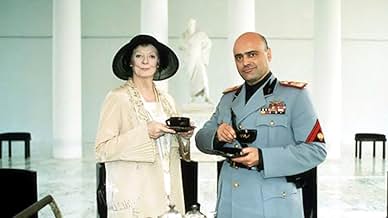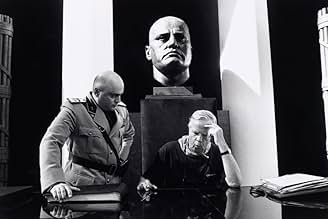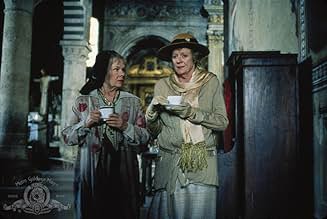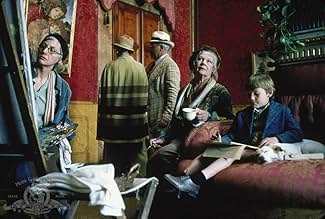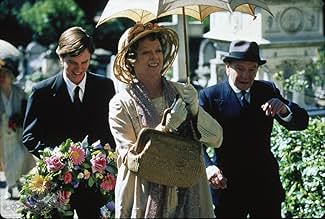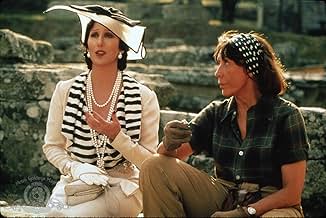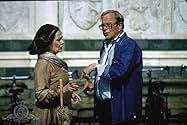CALIFICACIÓN DE IMDb
6.9/10
15 k
TU CALIFICACIÓN
Un niño italiano huérfano se cría entre un círculo de mujeres británicas y estadounidenses que vivían en la Italia de Mussolini antes y durante la II Guerra Mundial.Un niño italiano huérfano se cría entre un círculo de mujeres británicas y estadounidenses que vivían en la Italia de Mussolini antes y durante la II Guerra Mundial.Un niño italiano huérfano se cría entre un círculo de mujeres británicas y estadounidenses que vivían en la Italia de Mussolini antes y durante la II Guerra Mundial.
- Dirección
- Guionistas
- Elenco
- Ganó 1 premio BAFTA
- 5 premios ganados y 3 nominaciones en total
Opiniones destacadas
This film could have been titled 'four crazy grannies' for the marvelous portrayal of little old ladies, each more eccentric than the next. Like the comedy team of Matthau and Lemon, Dench, Smith and Plowright have a chemistry that is explosive.
Maggie Smith played a role that she has spent a lifetime perfecting. She captivates us as a snobbish dowager, tantalizes us with her improbable tea party and brings us to tears when she demonstrates her capacity to grow.
Although she may not have wowed us with her Shakespeare, Joan Plowright's compassion for her sudden charge made me wish (that at age 32) she would adopt me. Her love of the classics, remind us that art, literature and friends can help us transcend life's constant miseries.
Cher demonstrated that she could act in any time period. While Dame Judi Dench (not allowing herself to be typecast as a Queen) portrays a particularly pitiful creature as an aging artist with more passion than talent.
This film sends a clear message to Hollywood: experience and talent win out over T&A.
Applause at the end of this movie is to be expected.
Brava!
Maggie Smith played a role that she has spent a lifetime perfecting. She captivates us as a snobbish dowager, tantalizes us with her improbable tea party and brings us to tears when she demonstrates her capacity to grow.
Although she may not have wowed us with her Shakespeare, Joan Plowright's compassion for her sudden charge made me wish (that at age 32) she would adopt me. Her love of the classics, remind us that art, literature and friends can help us transcend life's constant miseries.
Cher demonstrated that she could act in any time period. While Dame Judi Dench (not allowing herself to be typecast as a Queen) portrays a particularly pitiful creature as an aging artist with more passion than talent.
This film sends a clear message to Hollywood: experience and talent win out over T&A.
Applause at the end of this movie is to be expected.
Brava!
This is a melodrama and you should not expect anything else. But what a melodrama! In the hands of a great director, using an eccentric story involving some eccentric people, it conveys straight to the heart how the great darkness descended upon Europe in the 1930's. It tells you that the greatest evil is the work of humans, and that the potential for evil lurks in the human soul. But, and here is the movie greatest strength, it shows you that humans possess the capacity to be human and to act human, when they heed Shakespeare's advice: "Love thyself last". All the negative comments that can be made about this or that deficiency caused me to downgrade this movie's rating from a "10" to a mere "9". Go see it. If you have kids - make sure to take them along for a great and satisfying lesson about life as it should be lived.
This is a very European movie. Whereas Hollywood overstates, Europe understates. The story is based on the autobiography of Franco Zeffirelli, born in 1922, who became a prominent Italian stage director and achieved world fame as a director of filmed stage pieces such as "Romeo and Juliet," "Hamlet, and "La Traviata." The film deals with the years 1935-44. After the death of his mother Zeffirelli, or Luca in the film, an illegitimate child more or less rejected by his father, was looked after by a group of eccentric art-loving English ladies who had made Florence their home - on their terms. The locals call them the "Scorpioni" - a tribute to their acid tongues. When Mussolini declared war on Britain in 1940, the ladies were interned in a beautiful mountaintop village near Florence, guarded by a couple of long-suffering policeman, their lifestyle of sketching, painting, art appreciation and fine dining scarcely changing.
The setting is the Florentine treasure troves of Tuscan art, the Uffizi, Il Duomo and the Academy. The English are led by three grand dames of the theatre, Joan Plowright as Arabella, Luca's chief protector, Maggie Smith, and Judy Dench (with her real life husband Michael Williams in a supporting role as the British consul.). Then there are two equally larger than life Americans, a retired but still glamorous movie star played by Cher, and a bike-riding lesbian archaeologist played by Lily Tomlin. Most of the Italian characters are overshadowed by all this Anglo ego. (Or maybe it's just poor dubbing, or John Mortimer's part in the scriptwriting). The two boys playing Luca at different ages are good looking but the older one in particular is a bit vacuous, and Cher's impossibly handsome Italian boyfriend puts in a wooden performance.
There are a couple of plot-lines (will Cher escape the Jewish round-up, will the ladies make it through the war OK) and the occasional funny scene but the interest is really in the characters. Not that all of them are particularly attractive people. Maggie Smith's Lady Hester, widow of a former British Ambassador to Italy, is a dreadful old snob with hardly any brains who likes the fascists and has scarcely a good word for anybody else except her late husband. She engineers the tea party with Il Duce, fondly imagining that Mussolini himself will ensure the ladies' safety in Florence. A few days later the local fascists tip them out of the Uffizi gallery where they were accustomed to take tea while they sketched the old masters. Yet at the end she does show a little genuine good grace when she intervenes to help Cher.
It's a curious piece, reminiscent of "Life is Beautiful" - a light comedy with a deadly serious titanic struggle between good and evil going on in the background, a background which seems altogether too gorgeous to accommodate such evil. Good, represented by a Scottish major, triumphs in the end, only to be put in his place by the Scorpioni. Zeffirelli here pays his artistic and personal debt to them. Wacky though they were, the Scorpioni did know the difference between good and evil, or at least the difference between good art and bad art, and they taught Zeffirelli well.
The setting is the Florentine treasure troves of Tuscan art, the Uffizi, Il Duomo and the Academy. The English are led by three grand dames of the theatre, Joan Plowright as Arabella, Luca's chief protector, Maggie Smith, and Judy Dench (with her real life husband Michael Williams in a supporting role as the British consul.). Then there are two equally larger than life Americans, a retired but still glamorous movie star played by Cher, and a bike-riding lesbian archaeologist played by Lily Tomlin. Most of the Italian characters are overshadowed by all this Anglo ego. (Or maybe it's just poor dubbing, or John Mortimer's part in the scriptwriting). The two boys playing Luca at different ages are good looking but the older one in particular is a bit vacuous, and Cher's impossibly handsome Italian boyfriend puts in a wooden performance.
There are a couple of plot-lines (will Cher escape the Jewish round-up, will the ladies make it through the war OK) and the occasional funny scene but the interest is really in the characters. Not that all of them are particularly attractive people. Maggie Smith's Lady Hester, widow of a former British Ambassador to Italy, is a dreadful old snob with hardly any brains who likes the fascists and has scarcely a good word for anybody else except her late husband. She engineers the tea party with Il Duce, fondly imagining that Mussolini himself will ensure the ladies' safety in Florence. A few days later the local fascists tip them out of the Uffizi gallery where they were accustomed to take tea while they sketched the old masters. Yet at the end she does show a little genuine good grace when she intervenes to help Cher.
It's a curious piece, reminiscent of "Life is Beautiful" - a light comedy with a deadly serious titanic struggle between good and evil going on in the background, a background which seems altogether too gorgeous to accommodate such evil. Good, represented by a Scottish major, triumphs in the end, only to be put in his place by the Scorpioni. Zeffirelli here pays his artistic and personal debt to them. Wacky though they were, the Scorpioni did know the difference between good and evil, or at least the difference between good art and bad art, and they taught Zeffirelli well.
Tuscany, 1935, a group of ladies walk along the streets of the city deservedly considered one of the world's art pearls, Florence. We don't know the ladies at first but, in time, we find them intelligent women who perfectly understand English but hardly understand orders. These are Scorpioni, elderly English women who will play a decisive role in the story as well as in the life of a young boy, Luca, strikingly similar to the director himself in his youthful years, Franco Zeffirelli...
Zeffirelli's autobiographical movie TEA WITH MUSSOLINI is a charming sentimental piece of work the action of which takes place in the Italy of the 1930s and 1940s: the hardest period not only in the lives of those many who were living then but for the entire 20th century history, when, as many readers will probably agree with me, humanity seemed to be conquered by infernal ideologies and bestial hatred. Yet, according to what Zeffirelli shows us in the movie, even in those darkest days, there was also room for beauty protection, care, art admiration and mutual help. As a Zeffirelli's fan, I consider TEA WITH MUSSOLINI one of the director's best films. But not because it only shows how bad war was. That is something most of us already know well. I love the film for other reasons. I like it because...
...there are moments when you will cry, when you will think and when you will genuinely laugh. A proper balance of emotions supplied by the director makes the movie a very decent entertainment filled with affection, sorrow, even nostalgia but also fun, charm and comfort. Who can possibly skip the scene of football match, for instance? I also laughed openly at the moment the ladies teach the soldiers saying "Good night". Isn't that a useful way to teach good manners and a foreign language at the same time? The moving moment in the orphanage will leave your eyes teary and the words of Ms Wallace about our contact with dead people may put you to nostalgia. But not for long. This fact of the film's "heart" goes in pairs with brilliant musical score Zeffirelli is famous for in his movies galore. What depth is there in this music and what supply of positive emotions!
...there are, except for variety of moments, beautiful Tuscan landscapes which make the movie a true postcard from Florence, San Gimignano and a true promotion of the Florentine art. This is also in accordance with the "soul" that Zeffirelli is so deeply attached to. The colorful hills around San Gimignano and the unique flowers under the Tuscany's sun leave hardly anyone indifferent. Consider, for instance, Luca's introduction of San Gimignano while he follows the bus with the ladies.
...there are foremost genuinely flawless performances that have to be linked to the deep development of characters. That is the aspect I'd like to pay more attention to in my comment. The ladies who occur to be at the focus are unforgettable. They supply the partly Italian movie with the truly English spirit. Maggie Smith does a wonderful job as Lady Hester: elegant, well mannered but also naive in her confidence in Mussolini and reluctant of Americans, the lady who drinks the spectacular but tragic tea with the duce. Judi Dench is memorable as Arabella who has drunk the wine of Florence, warmed her hands with the fire of Boticelli and Michelangelo and wants to share this inner experience with other people. Joan Plowright is, as usual, genuine and unforgettable. She fits to particular roles and although she has carried some other brilliant roles in latest Zeffirelli movies, Ms Mary Wallace seems to be the character for her. Joan portrays a warm hearted lady who is not only a good cook introducing Luca to bacon with eggs but also a great intellectual so much in love with Shakespeare. Cher representing the American side is also very appealing as Elsa - a luxurious woman with a flair for paintings, a Picasso connoisseur whose cup of tea is not only modern art but also good heart. She once helped Luca and the time will come for her to be helped in the spirit of Shakespeare "Love thyself less"... Through these different characters, Zeffirelli appears to present the wonder of diversity in human beings. The two seemingly contradictory characters, Elsa and Lady Hester, seem to be of totally opposite natures. Yet, even they turn out to have something in common... Finally a mention must be made of Baird Wallace who perfectly portrays Luca as a youngster and Charlie Lucas as Luca a little boy. Great young talents!
There is, finally, a great message of the film: that war cannot ruin the world, that the power of spirit is endless, that real art is born in the deep of one's heart. The final scene when Arabella says at the remained fresco of Santa Fina Funeral "Let Her sleep" seems to symbolize an eternal human quest for the sublime and the mysterious presence. If the "presence" is there, we shouldn't have anything to worry about. The horror of war is ceased and the historic sounds of San Gimignano bells ringing out joyfully together with the director's message proclaim the reconciliation and peace. The twin towers stand as silent witnesses...
Franco Zeffirelli, we should indeed appreciate art since it is the art that may bring out the genius of mankind.
Zeffirelli's autobiographical movie TEA WITH MUSSOLINI is a charming sentimental piece of work the action of which takes place in the Italy of the 1930s and 1940s: the hardest period not only in the lives of those many who were living then but for the entire 20th century history, when, as many readers will probably agree with me, humanity seemed to be conquered by infernal ideologies and bestial hatred. Yet, according to what Zeffirelli shows us in the movie, even in those darkest days, there was also room for beauty protection, care, art admiration and mutual help. As a Zeffirelli's fan, I consider TEA WITH MUSSOLINI one of the director's best films. But not because it only shows how bad war was. That is something most of us already know well. I love the film for other reasons. I like it because...
...there are moments when you will cry, when you will think and when you will genuinely laugh. A proper balance of emotions supplied by the director makes the movie a very decent entertainment filled with affection, sorrow, even nostalgia but also fun, charm and comfort. Who can possibly skip the scene of football match, for instance? I also laughed openly at the moment the ladies teach the soldiers saying "Good night". Isn't that a useful way to teach good manners and a foreign language at the same time? The moving moment in the orphanage will leave your eyes teary and the words of Ms Wallace about our contact with dead people may put you to nostalgia. But not for long. This fact of the film's "heart" goes in pairs with brilliant musical score Zeffirelli is famous for in his movies galore. What depth is there in this music and what supply of positive emotions!
...there are, except for variety of moments, beautiful Tuscan landscapes which make the movie a true postcard from Florence, San Gimignano and a true promotion of the Florentine art. This is also in accordance with the "soul" that Zeffirelli is so deeply attached to. The colorful hills around San Gimignano and the unique flowers under the Tuscany's sun leave hardly anyone indifferent. Consider, for instance, Luca's introduction of San Gimignano while he follows the bus with the ladies.
...there are foremost genuinely flawless performances that have to be linked to the deep development of characters. That is the aspect I'd like to pay more attention to in my comment. The ladies who occur to be at the focus are unforgettable. They supply the partly Italian movie with the truly English spirit. Maggie Smith does a wonderful job as Lady Hester: elegant, well mannered but also naive in her confidence in Mussolini and reluctant of Americans, the lady who drinks the spectacular but tragic tea with the duce. Judi Dench is memorable as Arabella who has drunk the wine of Florence, warmed her hands with the fire of Boticelli and Michelangelo and wants to share this inner experience with other people. Joan Plowright is, as usual, genuine and unforgettable. She fits to particular roles and although she has carried some other brilliant roles in latest Zeffirelli movies, Ms Mary Wallace seems to be the character for her. Joan portrays a warm hearted lady who is not only a good cook introducing Luca to bacon with eggs but also a great intellectual so much in love with Shakespeare. Cher representing the American side is also very appealing as Elsa - a luxurious woman with a flair for paintings, a Picasso connoisseur whose cup of tea is not only modern art but also good heart. She once helped Luca and the time will come for her to be helped in the spirit of Shakespeare "Love thyself less"... Through these different characters, Zeffirelli appears to present the wonder of diversity in human beings. The two seemingly contradictory characters, Elsa and Lady Hester, seem to be of totally opposite natures. Yet, even they turn out to have something in common... Finally a mention must be made of Baird Wallace who perfectly portrays Luca as a youngster and Charlie Lucas as Luca a little boy. Great young talents!
There is, finally, a great message of the film: that war cannot ruin the world, that the power of spirit is endless, that real art is born in the deep of one's heart. The final scene when Arabella says at the remained fresco of Santa Fina Funeral "Let Her sleep" seems to symbolize an eternal human quest for the sublime and the mysterious presence. If the "presence" is there, we shouldn't have anything to worry about. The horror of war is ceased and the historic sounds of San Gimignano bells ringing out joyfully together with the director's message proclaim the reconciliation and peace. The twin towers stand as silent witnesses...
Franco Zeffirelli, we should indeed appreciate art since it is the art that may bring out the genius of mankind.
I had wanted to see this film for some time and when the opportunity finally materialised I was enthralled. It is probably the best performance I have seen by Maggie Smith, who often seems to be playing the same character actually. But this is her best since Miss Jean Brodie, and Joan Plowright, Judi Dench, Lily Tomlin and Cher are all equally impressive.
The settings are skilfully designed to draw the viewer in, and when you are setting your movie in Florence and its environs you can't go wrong anyway. The ongoing clash between two worlds i.e. Lady Hester Random (Maggie Smith) versus Elsa (Cher) reaches a satisfying resolution which it would be unfair to reveal.
There are splendid comic vignettes mixed into the overall drama. Judi Dench and her dog being thrown out of the cathedral, sharply contrasts with the chilling moment when the Jewish arts professor is taken away by the Gestapo. Understated but none the less effective, probably more so, because of it.
If you haven't seen this film, see it as soon as you can.
The settings are skilfully designed to draw the viewer in, and when you are setting your movie in Florence and its environs you can't go wrong anyway. The ongoing clash between two worlds i.e. Lady Hester Random (Maggie Smith) versus Elsa (Cher) reaches a satisfying resolution which it would be unfair to reveal.
There are splendid comic vignettes mixed into the overall drama. Judi Dench and her dog being thrown out of the cathedral, sharply contrasts with the chilling moment when the Jewish arts professor is taken away by the Gestapo. Understated but none the less effective, probably more so, because of it.
If you haven't seen this film, see it as soon as you can.
¿Sabías que…?
- TriviaCher has stated that the only reason she took the part of Elsa was because Writer and Director Franco Zeffirelli said he could only see her and no other actress in the role.
- ErroresThe tanks the Germans ride in are, in fact, U.S. Army M4 Shermans, not German-built Panzers.
- Citas
Lady Hester: The Germans and the Italians couldn't get rid of us. There is absolutely no reason why we should surrender to the Scots.
- Versiones alternativasThe MGM DVD, ISBN 0-7928-4300-2, is missing least one shot: The original tea with Mussolini scene ends with Mussolini forcing himself upon the reporter, forcing her onto his desk (i.e., he rapes her.) This DVD omits that ending and leaves the reporter's change in behavior unexplained.
- Bandas sonorasMattinata Fiorentina
Written by Giovanni D'Anzi (as D'Anzi) and Michele Galdieri (as Galdieri)
Performed by Alberto Rabagliati
Selecciones populares
Inicia sesión para calificar y agrega a la lista de videos para obtener recomendaciones personalizadas
- How long is Tea with Mussolini?Con tecnología de Alexa
Detalles
Taquilla
- Presupuesto
- USD 12,000,000 (estimado)
- Total en EE. UU. y Canadá
- USD 14,401,563
- Fin de semana de estreno en EE. UU. y Canadá
- USD 1,633,183
- 16 may 1999
- Total a nivel mundial
- USD 14,401,563
- Tiempo de ejecución1 hora 57 minutos
- Color
- Mezcla de sonido
- Relación de aspecto
- 1.85 : 1
Contribuir a esta página
Sugiere una edición o agrega el contenido que falta

Principales brechas de datos
By what name was Té con Mussolini (1999) officially released in India in English?
Responda

